News and Announcements
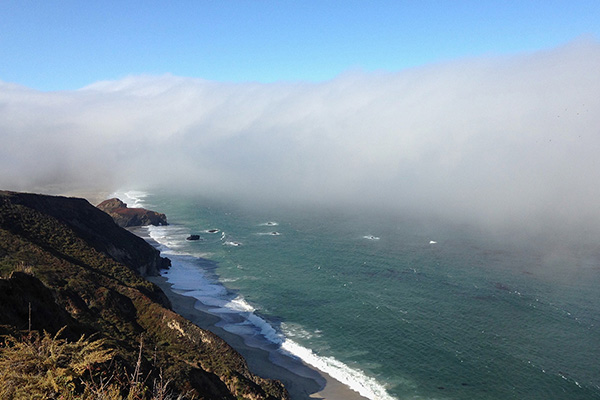
If you live in the Bay Area, you know Karl the Fog. Many of us have a love-hate relationship with our misty friend and how it influences our outdoor plans. However, Karl — aka coastal fog — is vital for our ecosystem and what makes the California coast special.
The Heising-Simons Foundation awarded SFSU School of the Environment Associate Professor Sara Baguskas and her collaborators a five-year, $3.65 million grant (approximately $730,000 per university) for the Pacific Coastal Fog Research (PCFR) project. The Heising-Simons Foundation is a family foundation that works with its partners to advance sustainable solutions in climate and clean energy, enable groundbreaking research in science, enhance the education of our youngest learners and support human rights for all people.
“We are working together to establish a fog-monitoring network that spans the entire coastline and different ecosystems, from redwood forests to maritime chaparral to agriculture, urban and bluff scrub,” Baguskas said. Not only will this new project monitor current conditions, but it will allow scientists to better predict future patterns. “All these are different ecosystems that Californians love and are important to people and biodiversity.”
The team will set up sensors along the coast to capture information about fog events, such as moisture, radiation, energy balance, temperature, relative humidity and more. At SFSU, Baguskas, who specializes in how plants respond to environmental (fog) changes, will collaborate with School of the Environment Director and Professor Andrew Oliphant, an expert in measuring changes in surface climate and associated land-atmosphere exchanges of carbon and water.
“It’s really interesting, and I’m really excited about the work that’s being done to create this network,” said Geography master’s student Harvey Hightower (B.A., ’23), noting its potential for conservation efforts and fog-water collection as a supplemental water source. “We can’t figure out these kinds of plans or know if it’s feasible without a network and more research.”
For his thesis, Hightower works with Baguskas to study the relationship between coastal fog and an invasive plant species spreading with changing grazing patterns at Point Reyes National Seashores. The project is a major step toward his professional goal of working on restoration of native California grasslands.
The PCFR group hopes its work will have a social impact and inform society’s ability to manage coastal resources in a changing climate. A major strength of this project is the range of expertise at the collaborating institutions — SFSU, Indiana University Bloomington, Scripps Institution of Oceanography, CSU Monterey Bay and UC Santa Cruz. As part of this work, the scientists will also partner with UC Nature Reserves (UC Santa Barbara, UC San Diego, UC Santa Cruz, UC Berkeley and UC Davis), farm management professionals (such as farm managers and irrigation managers) and more.
“We’ve never had this opportunity to work together and coordinate, to ask big questions about this [fog] phenomenon that is going to be more and more important as climate continues to change,” Baguskas said. Pooling expertise and resources means the group will have a better understanding of fog water fluxes, fog water chemistry and biology, spatial and temporal patterns of fog, atmospheric models and more.
Baguskas and Oliphant are excited to get more students involved in research through this five-year project. Student researchers like Hightower will get research experience and grow their scientific network by working with collaborators. She aims to possibly establish one fog monitoring station on campus, making it easier for students to engage.
“I always look forward to hearing how our students are perceiving the world, especially in science, where there’s a need for more diverse perspectives and voices,” she said. “Over time, I’ve learned so much about why science matters through our students. To be a part of their scientific journey, watching them apply their knowledge and skills and strength into the world of new jobs and grad positions, has been enriching.”
Baguskas’ former student Kapewa Hopfe (B.S., Environmental Science, ’24; B.A., Geography, ’24) is now a conservation technician at Stanford, restoring habitats and maintaining native populations of species in the university’s preserves and creeks. As an undergraduate, his first research experience included prior coastal fog research projects with Baguskas and Oliphant.
“It really opened my eyes to career paths of doing research outside, doing field work and having a nature-based career. It influenced me into doing conservation work I’m doing now,” he said, adding that he gained a lot of skills. “I was working with a lot of experience with different scientific equipment that I can leverage for jobs. I also had a lot of experience with data entry and field work experience.”
Learn more about SFSU’s School of the Environment.
Photo by Sara Baguskas and Kapewa Hopfe
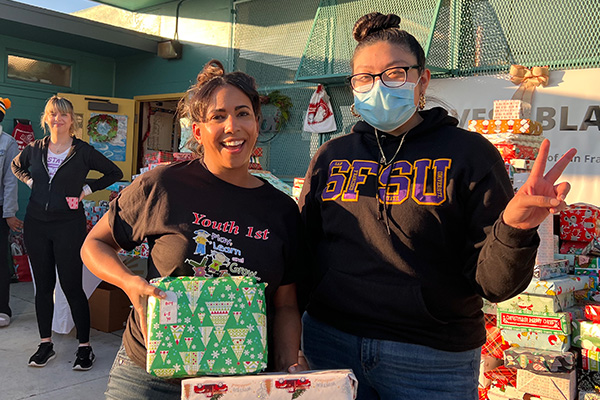
Join the Institute for Civic and Community Engagement in spreading cheer this holiday season with SFSU’s annual toy drive. Donations of new, unwrapped toys and gift cards will be accepted through Friday, Dec. 19.
All toys collected will be distributed at the Youth 1st OMI-Lakeview Annual Holiday Extravaganza on Friday, Dec. 12. This community-led event supports hundreds of children and families through gifts, food, entertainment and resources. After Dec. 12, remaining donations will also support the San Francisco Firefighters Toy Program, extending the joy even further across the city.
Photo courtesy of the Institute for Civic and Community Engagement
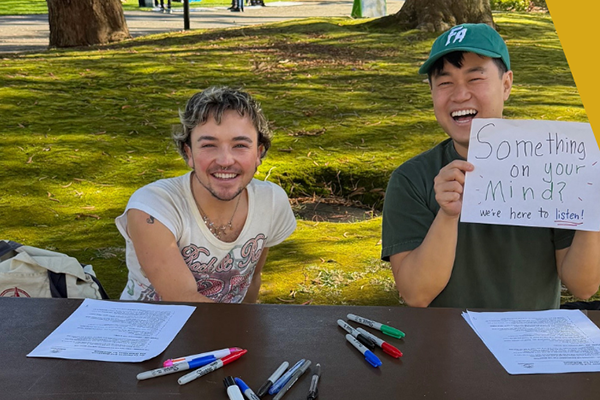
Need someone to listen to? Worried about midterms? Uncertain about jobs and career? Tired working multiple full-time jobs? Have a dilemma you would like to talk about? Walk in and have campus mediators-in-training listen to you without judging or offering advice. Students from the Communication Studies 430: “Peer Mediation” class will have their active listening booth outside the Cesar Chavez Student Center, 1 – 4 p.m., on Mondays, Nov. 17, Nov. 24, Dec. 1 and Dec. 8.
Communication Studies 430 meets the requirement of the interdisciplinary Conflict Resolution Certificate.
For questions about the class or the Conflict Resolution Certificate, please email Ashmi Desai at ashmidesai@sfsu.edu.
Photo courtesy of Ashmi Desai
The second slice of the “Return of the JEDI PIE Certificate” series, called “Do or Do Not,” is a five-module asynchronous course from the Center for Equity and Excellence in Teaching and Learning (CEETL). It can be completed in 8 – 10 hours, scaffolded with in-person Justice, Equity, Diversity and Inclusion (JEDI) workshops designed to support culturally responsive teaching practices.
Modules cover accessibility and universal design for learning, social justice syllabus, data-informed teaching, transparency in learning and teaching, equitable assessments and centering student voice, belonging and experience. This course launches Monday, Nov. 17, and will run until March 20. Those who complete the course within this time frame will receive a $250 stipend and a digital badge. The course will remain open beyond March 20 and can be completed for a badge.
“Return of the JEDI PIE Slice 1” is a prerequisite for this course. Self-enroll in “Slice 1” and complete for a badge by visiting the Canvas website. Those who have completed “Slice 1” will be automatically enrolled in “Slice 2” starting on Nov 17.
The SFSU Academic Senate will meet Tuesday, Nov. 18, 2 – 5 p.m., via Zoom for its sixth meeting of the academic year.
- Recommendation from the Academic Policies Committee in second reading:
- Revision to Policy on Requirements for Graduate Students, No. S25-295
- Recommendation from the Campus Curriculum Committee in second reading:
- M.S. in Earth and Environmental Science: Name change and program revision
- M.A. in Geography, Resource Management and Environmental Planning: Elevation form concentration to stand alone degree
- M.N. in Africa and Globalization: Name change and program revision
- M.N. in Accounting: Reactivation
- Recommendation from the Educational Policies Committee in first reading:
- Master of Science in Nursing: Neonatal Clinical Nurse Specialist (Entry Level): Discontinuance
- Master of Science in Nursing: Neonatal Clinical Nurse Specialist: Discontinuance
- Bachelor of Arts in Comparative and World Literature: Discontinuance
- Master of Arts in Geography: Discontinuance]
- Bachelor of Science in Physics, concentration in Physics for Teaching: Discontinuance
- The Senate will hear a presentation from:
- Jamillah Moore, vice president for Student Affairs and Enrollment Management: “SFSU Protocols Regarding Immigration Enforcement” (time certain 3:45 – 4 p.m.)
Curious about how to use ChatGPT effectively? Join Academic Technology for “AI Student Commons: ChatGPT 101," a 90-minute interactive session Monday, Nov. 17, at 2 p.m. in Library 282 and via Zoom.
This workshop will introduce you to the basics of ChatGPT, including how to get started, explore key features, and use it responsibly and efficiently for learning, research, and creativity.
The session includes a live demonstration, guided feature overview, and a hands-on component where you’ll have the opportunity to experiment and ask questions.
SFSU librarians will hold “Research for Real Life,” an interactive, fact-checking workshop for students on Tuesday, Nov. 18, 1:30 – 2:30 p.m., in Library 284. Pizza will be provided.
Learn about several tools you can use to fact-check information you come across in your daily life. Whether it’s social media, articles, ads or that article your family member shared in the group chat, how can you know what to trust? And how can you find something reliable?
Please let your students know they can RSVP via GatorXperience.
Celebrate International Education Month and hear from SFSU study abroad returnees on Thursday, Nov. 20, noon – 1 p.m., in the Library Teaching and Learning Commons (Library 286). Join the All-University Committee on International Programs for its final coffee hour of the semester. Enjoy light refreshments and coffee, courtesy of the Division of International Programs, while connecting with internationally minded faculty, staff and administrators.
Please RSVP via Qualtrics for the International Coffee Hour. Your RSVP is kindly requested but not required.
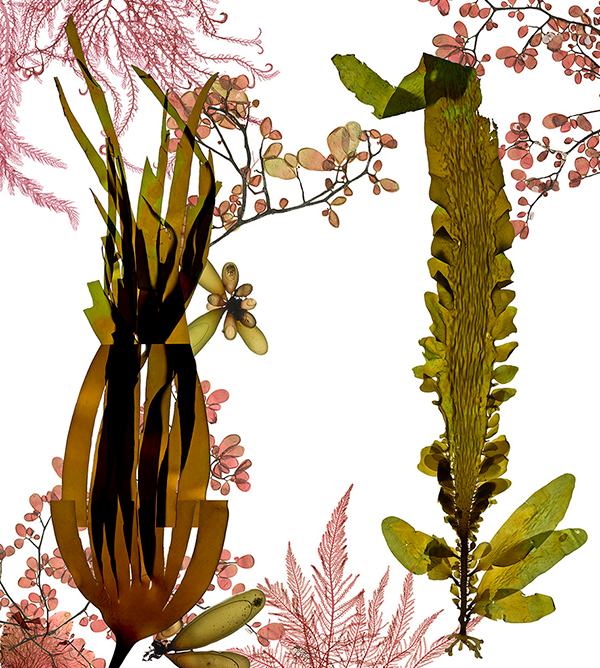
The campus community is invited to join the College of Science & Engineering and School of Design for “Five Foundational Kelp: Mural Unveiling by Josie Iselin” on Thursday, Nov. 20, 4 – 5 p.m., in the second-floor lobby of the Science & Engineering Innovation Center. Iselin will speak about her work at 4:20 pm.
Please RSVP for the “Five Foundational Kelp” reception via Qualtrics.
Curious about ChatGPT Edu and what it can do for you, but not sure where to start? The “Getting Started with ChatGPT Edu” introductory workshop offers a guided tour of the secure, CSU-licensed version of OpenAI’s ChatGPT, available to all active SFSU faculty, staff and students. It will be held Friday, Nov. 21, 2 – 3 p.m., via Zoom.
You’ll learn what ChatGPT Edu is, how to access and navigate the platform, and how key features can support productivity and learning in various contexts. By the end of the session, you’ll be ready to explore ChatGPT Edu in your own work.
This workshop is brought to you by the AI Literacy Education Program.
Join the College of Liberal & Creative Arts’ “Research First: A First-Year Showcase of the College Undergraduate Research Experience” on Monday, Dec. 1, 2 – 3:15 p.m., and Thursday, Dec. 4, 11:30 a.m. – 1:30 p.m., in Library 121. The showcase will feature undergraduate research from lower-division classes. Light refreshments will be provided.
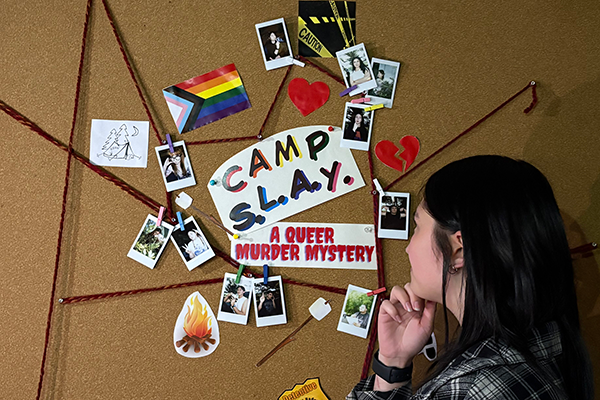
SF State Rep proudly presents “Camp S.L.A.Y.: A Queer Murder Mystery!” on Wednesday, Dec. 3, and Friday, Dec. 5, at 3 p.m. in the Little Theatre (Creative Arts 107). This new comedy by Alison Radkey follows a gaggle of gay people who find themselves at a retreat camp solving a whodunit murder. The play is part of the School of Theatre and Dance’s fall 2025 season.
To adhere to SF State Rep company values, the play is written by a student who identifies as a queer woman, and the cast and design team is composed of a variety of races, genders and ethnicities. The company values the opportunity to give a platform to marginalized groups.
Set at a camp retreat in the Santa Cruz mountains, a group of queer people gather to unplug and explore their relationships. Little do they know, not everyone will make it out alive. This whodunit murder mystery navigates themes of unlikely friendships, reconnection, identity, and empathy.
Photo by Elijah Su
SF State Spotlight
Assistant Professor of Counseling Sherée D. Harper presented on Oct. 9 at the annual Association for Play Therapy International Conference in Houston. Harper delivered a poster presentation titled “Exploring Factors Related to the Use of Child-Centered Play Therapy Among Elementary Professional School Counselors.”
She highlighted the results of her research, which explored whether play therapy training, adverse childhood experiences of professional school counselors and cultural humility were related to the use of child-centered play therapy/play therapy in addressing students’ mental health needs among elementary school counselors.
Professor Emeritus of Mathematics Sheldon Axler won the Wolfram Innovator Award for his contributions to mathematical education and publications. He received the award during the Wolfram Virtual Technology Conference, held Nov. 5 – 7.